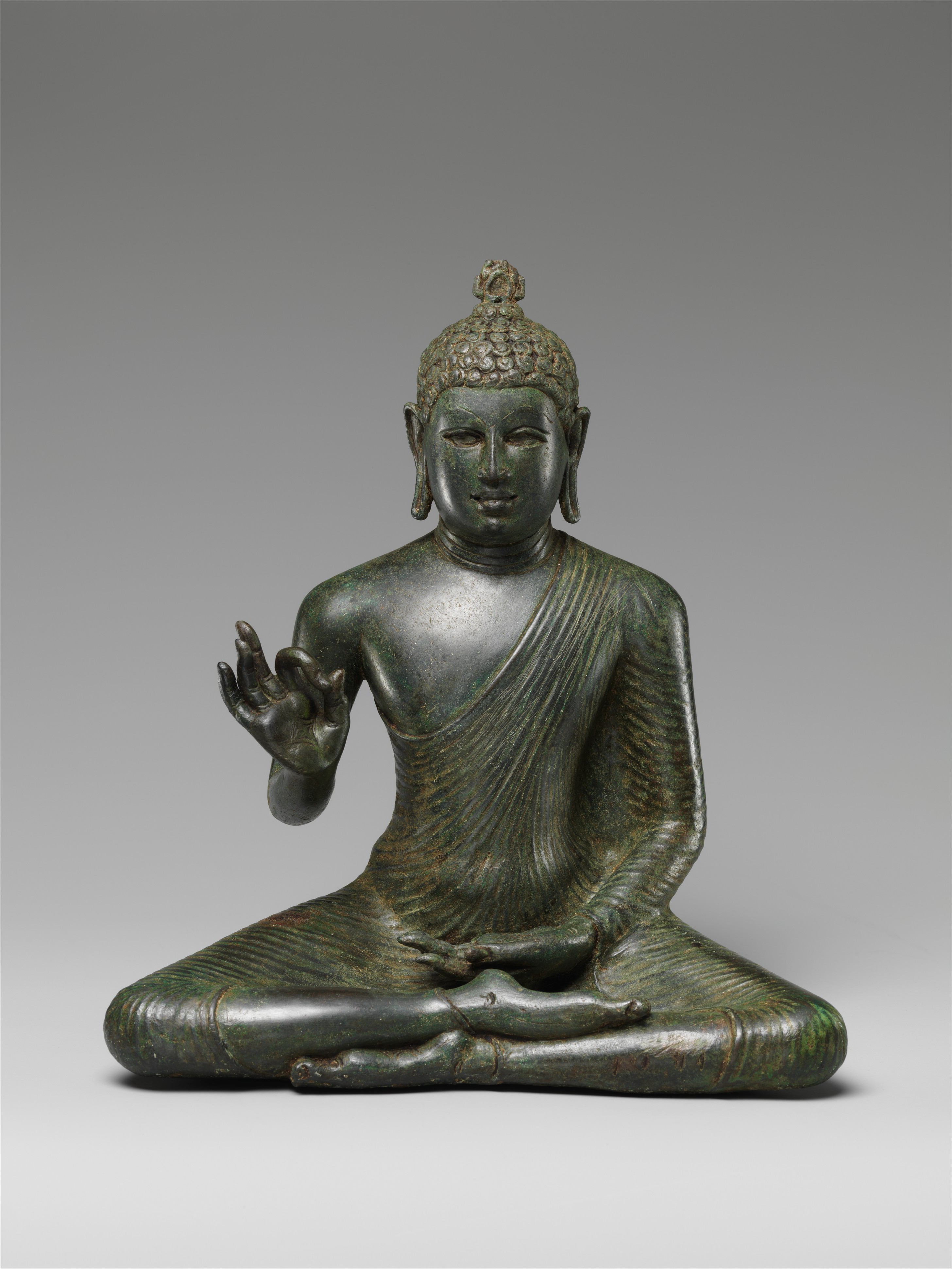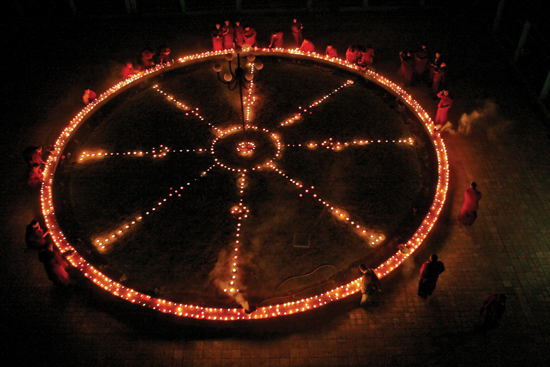Masonic Articles and Essays
Dharma and Freemasonry
Very Ills..... Bro... Kristine Wilson-Slack 33o
Date Published: 7/6/2022
Dharma reminds us that each of us has a path; that path is our own to walk and that we walk it with the entirety of the Universe. The exploration of our Dharma also bridges the gap of knowing thyself superficially to understanding that we play a part in the unfolding Evolution of the whole cosmos, of the Supreme Will in Evolution. As we wind down the road of Freemasonry, regardless of the degree, we could look to the lessons of the ritual to weave all these meanings together. Freemasonry provides us a multitude of opportunities to work with ourselves and Humanity at the same time. We need each other. Certainly, we need time alone to know who we are, yet there are some things about ourselves that we can only learn in interaction with others.
Nosce te Ipsum is a phrase we all know to mean “know thyself.” We are told at the very beginning of our Masonic journey, that our every movement forward will be directed by divine wisdom, by the motto “NOSCE TE IPSUM – Know Thyself.” Once we begin this journey and discover ourselves, then we will know the Universe and God. Throughout the ages, this axiom has been a term of self-acknowledgment, self-awareness, and moderation. This is an ancient Greek motto, which we have accepted for ourselves. What does this mean to us as Freemasons and seekers of Truth?
The apprentice to Freemasonry is directed again and again to look into that which feeds their nature and to let Wisdom and Virtue guide them. They must look into their very heart as well as their mind. To know a thing means to understand its true nature.
The first thought that many may have is that this means to know who we are in this life, what we like and dislike, and what talents or foibles we have. I see this as an undeveloped or basic use of the idea, a knowledge of the material self, or what we might call familiarity with our physical bodies and minds. When we say, “I like chocolate,” we have the awareness that I, this person, this body and mind like chocolate. We use our senses to perceive the world around us and make judgments about it, exclaiming that we like or dislike a thing or circumstance. We decide in the course of our experiences that “I am Catholic” or “I am a doctor.” We may say “I am a Republican” or “I am spiritual.”
Is that knowing yourself?
Some may then say, oh, of course, I am the divine, I am a manifestation of Divinity, the spirit-in-matter. They look to philosophy or religion to gain insight into the idea of who they are. While this might not be wrong, the leap from one to another ignores much awareness in-between. The seeker jumps from the idea of physical being to the idea of divinity incarnate. To me, this feels incomplete and honestly, a little too easy. It lacks an innate awareness of “who I am.” I believe there is a middle step to this evolution of the spirit, and that is the understanding or knowledge of our Dharma. While we don’t use this term explicitly in our rituals, apart from one, I believe Freemasonry has something to say about this path of learning our dharma in order to complete the full idea of “knowing thyself.”

Dharma is, according to the ancient Sanskrit, “to hold, to maintain, to preserve.” In the early Vedas and other ancient Hindu texts, Dharma referred to the cosmic law that created the ordered universe from chaos. According to theosophy, Dharma [from the verbal root dh? to bear, support] means equity, justice, conduct, duty; right religion, philosophy, and science; the law per se; the rules of society, caste, and stage of life.[1] This definition of Dharma ties immediately to what we know is the goal of Freemasonry: Ordo ab Chao – Order from Chaos.
In the book Dharma, Bro. Annie Besant tells the story of Bhishma and his life of Duty. In this story, which derives from the Mahabharata, Bhishma, the embodiment of Dharma, explains the characteristics needed and the virtues we must cultivate to begin to understand our Dharma after he himself has lived a life of duty and his Dharma. In his monologue, he explains to the other princes and gods what dharma is and how it relates to morality and action. Besant explains it thus:
Morality…cannot be understood without a knowledge of what is meant by Dharma – with regard to morality, some think that it is a simple thing. So it is in its broad outlines. The boundaries of right and wrong, in the common actions of life, and clear, simple, and definite. For a man of small development, for a man of narrow knowledge…morality seems simple enough…for those with deep knowledge… morality is difficult.[2]
Bro. Besant goes on to state, unmistakably, that a single morality is not for everyone. That is, each of us has our own morality:
“…morality is not as simple as one would think, one and the same for all; because it varies with the Dharma of the individual.”
~ Bro. Annie Besant
Morality, Besant maintains, is based on the Dharma of the human who is acting and not on some idea of absolute right and wrong. Why does Dharma have an individual nature?
It is because “Dharma is the inner nature, which has reached in each man a certain stage of development and unfolding.”

Leadbeater, Besant, & Olcott
If we consider that we are working toward the evolution of humanity, toward the perfecting of humanity, we must first come to understand our differences. We must understand that there is a different Dharma for one than there is for another, and in understanding the duty, our personal duty, we come to the beginning of understanding what our path may be. The full definition of Dharma, according to Bro. Besant is “the inner nature marked by the stage of evolution (of the individual) plus the law of growth for the next stage of evolution.” If we consider that evolution is the totality of the universe consisting of all its individual parts marching toward their own perfection (which includes each of us), each of us has our own evolution to work on to contribute to the completeness of the universe.
This idea ties directly to the exhortation made by the Master to the new Apprentice, upon receiving their clothing and tools: As an Apprentice in Masonry, you are in search of Light. You represent both an individual and Humanity. We continue to learn that we have a duty to sacrifice for the welfare of the People and to build up in men’s minds the idea of Evolution. This evolution is the restoration of the Human with the Divine – the individual with the Divine but for all of Humanity.
According to Hindu and Buddhist texts as derived by early theosophists, Dharma also means an essential or characteristic quality or peculiarity, approaching close to the meaning of Svabhava.[3] What do we mean by ‘essential character?” Let’s dig deeper then: what is Svabhava?
Svabhava, (Sk: svabhavat) in short, may be called the essential individuality of any monad, expressing its own characteristics, qualities, and type, by self-urged evolution. It roughly translates to “own-being” or “own-becoming.” “From it, all nature proceeds, and into it, all returns at the end of life cycles.” -
“The essential self, like a sun, sends a ray from itself into manifestation, and the vehicles formed by this ray express its own unique individual essence and path of evolutionary growth and experience. Every entity, in all ranges of its being, reflects its own essential individuality which is stamped on its inmost essence.[4]”
~ The Theosophical Glossary
Extrapolated, this means that we cannot produce or be anything that is not “us.” What we are is ingrained in our very being, the divine manifestation that is yet to be discovered. In fact, it is our duty, our Dharma, to be who we are meant to be.
Put differently, as Bro. Oscar Wilde said, “Be yourself. Everyone else is taken.”
If we apply the idea of self-urged evolution, this is certainly supported in Freemasonry. Our path in Freemasonry is solely ours. It isn’t for anyone else to “push” you to go this way or that – it is truly an individual path in a community of like-minded people. Freemasonry provides the opportunity to work, to learn the skills of working externally and internally, with a goal of continuous improvement. No Freemason will force the path on another; it is up to the individual to freely walk their own journey.
This is continuous striving. This is growth. We seek a path to “know ourselves,” and for us, we’ve chosen Freemasonry. Why? Because it fits best with who we are, at our core. Something speaks to us in a beautiful and harmonious way, leaning into our natures in a way that nothing else has. In this philosophy, we are finding our Dharma. Freemasonry doesn’t concern itself with your religion or your dogma; it concerns itself with being the builder of Universal Religion and this is the foundation of the philosophy of Freemasonry. All religions, all philosophies, and all Mysteries have Truths that are shared and common amongst people.
Buddha said: “The mind is everything. What you think is what you become.” This is a lesson that we hear again and again during the course of being a Freemason. Freemasonry does not teach us what to think but how to think, how to dig dungeons to vice and build temples to virtue. Why? Because it serves not only us but Humanity. We will work on our own crude natures, not to make our individual selves better but to cooperate with the Supreme Will in Evolution. How? By understanding what our individual contributions are and providing them selflessly to whatever needs to be done.

The Wheel of Dharma
Dharma reminds us that each of us has a path; that path is our own to walk and that we walk it with the entirety of the Universe. The exploration of our Dharma also bridges the gap of knowing thyself superficially to understanding that we play a part in the unfolding Evolution of the whole cosmos, of the Supreme Will in Evolution. As we wind down the road of Freemasonry, regardless of the degree, we could look to the lessons of the ritual to weave all these meanings together. Freemasonry provides us a multitude of opportunities to work with ourselves and Humanity at the same time. We need each other. Certainly, we need time alone to know who we are, yet there are some things about ourselves that we can only learn in interaction with others.
I believe that in this weaving of experience with our fellow Brothers, the Truth of our Dharma is revealed. From there, the path continues toward a greater understanding of Nature – the Divine Universe. By living our Dharma, “we’re all just walking each other home.”[5]
[1] The Theosophical Glossary
[2] Dharma, pp21-22, Annie Besant, Masonic Publishing Company, 2017
[3] The Theosophical Glossary
[4] The Theosophical Glossary
[5] Ram Das quotation
